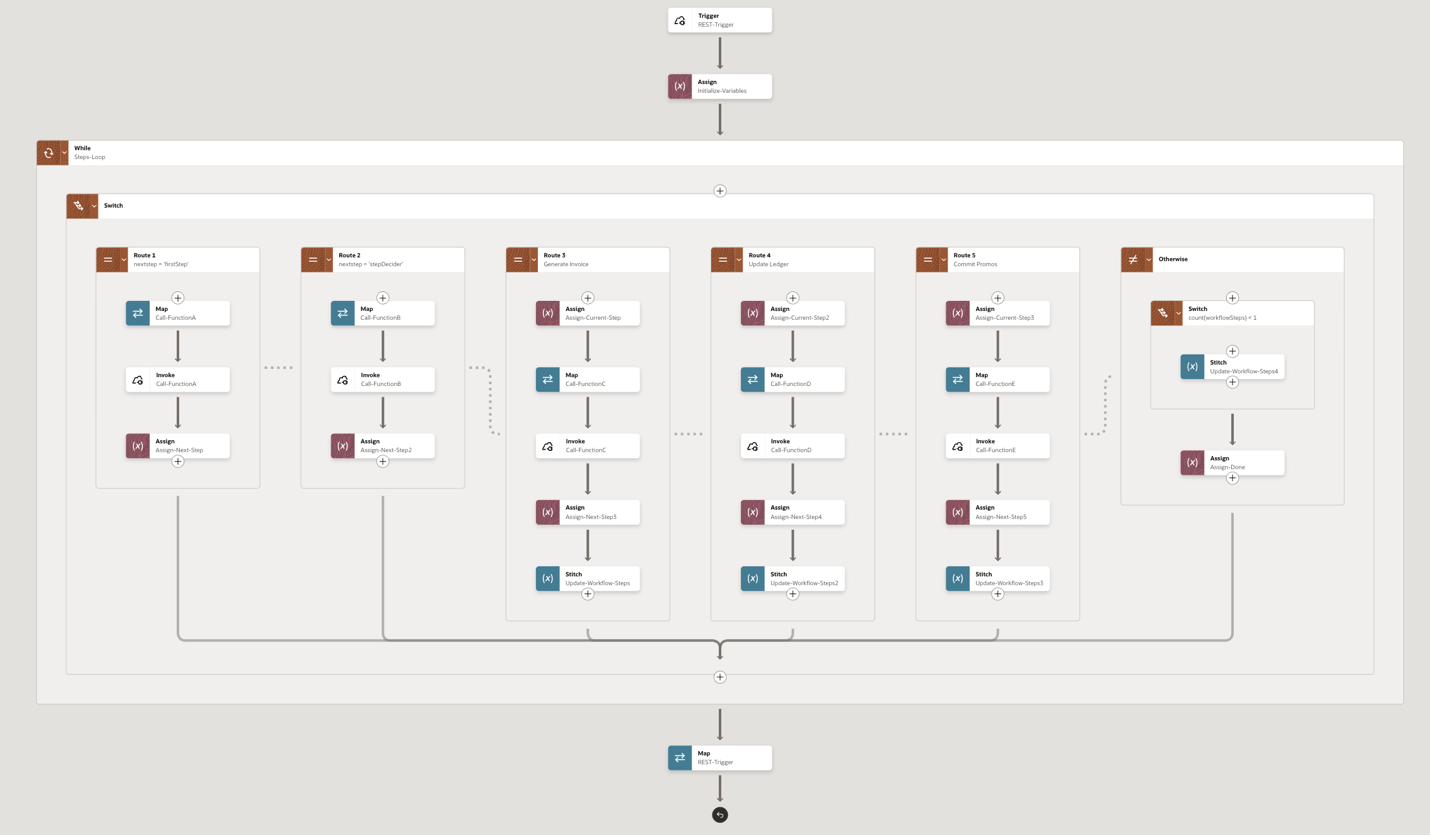In today’s microservices based environment, organizations increasingly look for cloud-agnostic architectures that foster flexibility, scalability, and innovation. One common challenge organizations face is migrating proprietary cloud services—such as AWS Step Functions—to solutions that enable greater portability and reduced vendor lock-in.
At Oracle, we’ve adopted a modern architecture pattern to achieve just that. By replacing AWS Step Functions with Oracle Cloud Infrastructure (OCI) Functions and Oracle Integration Cloud (OIC), we’re empowering our teams (and customers) to orchestrate complex workflows with greater agility and control.
Why Replace AWS Step Functions?
Amazon’s Step Functions enable coordination of distributed applications using functions or microservices as steps in a workflow. However, this approach can result in tightly coupled orchestration logic that’s difficult to port across clouds and is dependent on AWS Lambda, which is itself a proprietary and cloud-specific compute service.
The challenges:
- Vendor Lock-In: AWS Step Functions and Lambda are only available on AWS.
- Limited Portability: Function code can’t be easily moved to other cloud environments.
- Complexity: As workflows grow, Step Function definitions can become difficult to maintain and evolve.
The OCI Solution: Decoupling Logic with OCI Functions & Oracle Integration Cloud
Our architecture decouples workflow logic and execution by leveraging OIC integrations as the intelligent orchestrator—replacing the monolithic Step Functions definition—with portable, open-source OCI Functions (based on the open-source Fn Project) as the units of work.
How it works:
- Oracle Integration Cloud implements all workflow orchestration and business logic. Its graphical interfaces enable rapid design and management of multi-step workflows, decision trees, and exception handling.
- OCI Functions perform stateless, serverless tasks triggered by the integrations at various steps. Unlike AWS Lambda, OCI Functions use the open-source Fn engine, which means you can lift and shift your functions to any cloud or on-premises environment supporting Fn.
Benefits of This Approach
- Cloud Agnosticism and Portability:
OCI Functions, based on the Fn Project, can run anywhere. If your strategy shifts, your investment in function logic is protected. - Powerful, Low-Code Orchestration:
Oracle Integration Cloud offers robust workflow modeling and management without embedding orchestration inside your function code. Logic is visible, portable across environments, and managed centrally. - Rapid Integration:
OIC comes with a rich set of prebuilt integrations and adapters, making it easy to connect with other Oracle and third-party services—reducing development time and accelerating deployments. - Simplicity and Maintainability:
The workflow is decoupled from function implementation, yielding clear separation of concerns. This makes your system easier to manage, monitor, and evolve. - Enterprise-Grade Capabilities:
Oracle Integration Cloud delivers built-in data transformation, monitoring, error handling, and connectivity, supporting even the most complex workload orchestration needs. - Faster Time-to-Market:
Prebuilt templates and low-code tools expedite development cycles and streamline deployment.
Realizing the Vision: A Sample Architecture
- Workflow Initiation: An event such as a REST call triggers an integration within OIC.
- Multi-Step Orchestration: The workflow proceeds through multiple stages, applying conditional logic and branching decisions.
- Serverless Invocation: At appropriate junctures, the OIC integration invokes OCI Functions for discrete, stateless operations.
- Integration and Transformation: Data is seamlessly transferred between steps, integrated with OCI or external services, and transformed as needed within OIC.
- Monitoring and Exception Handling: OIC’s monitoring tools provide observability and alerting throughout the process lifecycle.

Conclusion
Migrating from AWS Step Functions/Lambda to OCI Functions and OIC offers organizations improved portability, simplicity, and advanced orchestration capabilities—all while leveraging the power and flexibility of Oracle’s integration ecosystem.
Embrace the future of multi-cloud orchestration with OCI Functions and Oracle Integration Cloud. Unlock agility, reduce risk, and empower your business for whatever comes next.
Learn more about OCI Functions here, and Oracle Integration Cloud here.
Then start putting this into practice by completing this OCI LiveLab. It provides an end-to-end example of using native actions within an integration to harness OCI services, including Functions.

